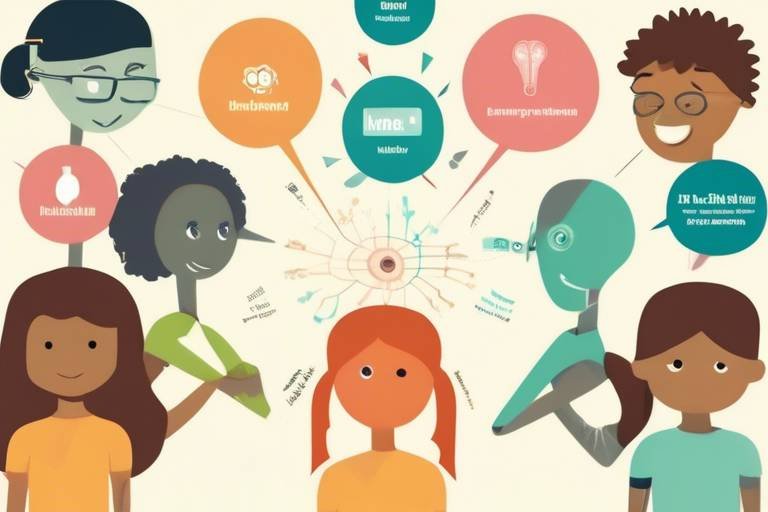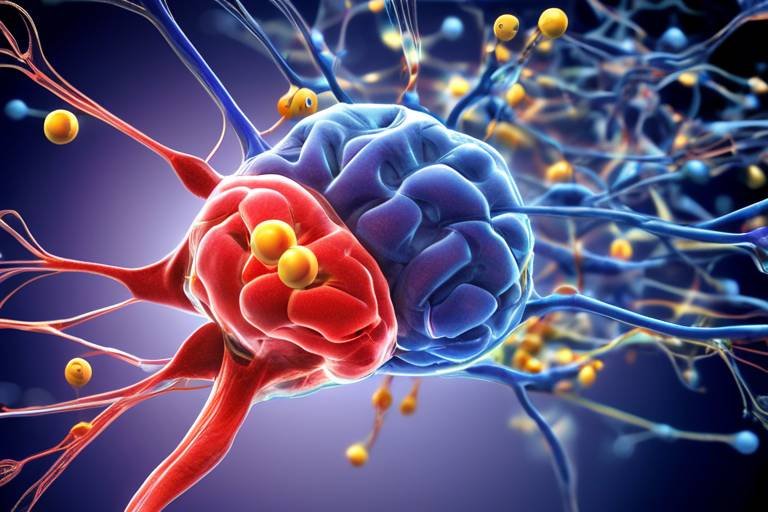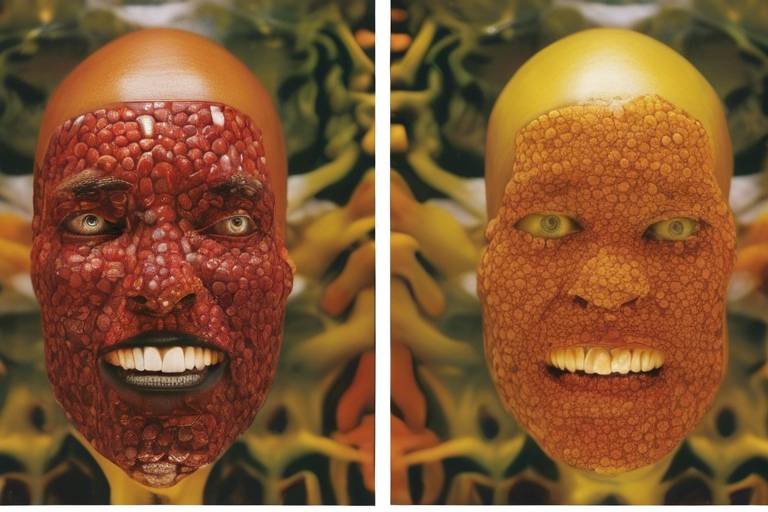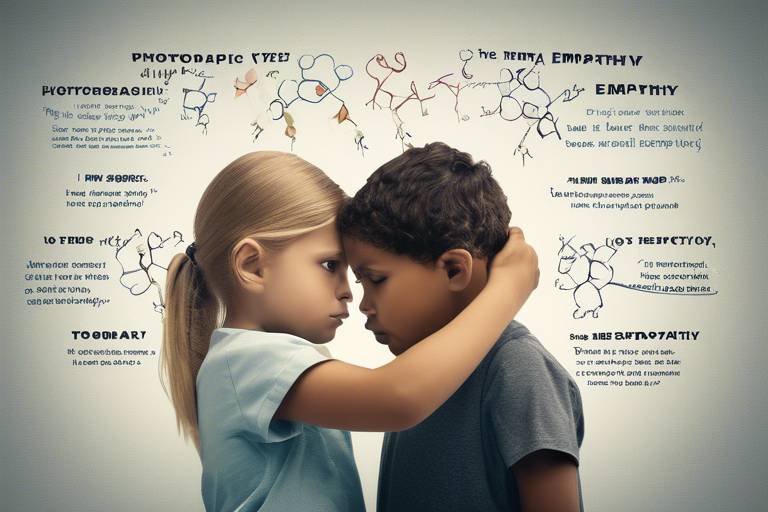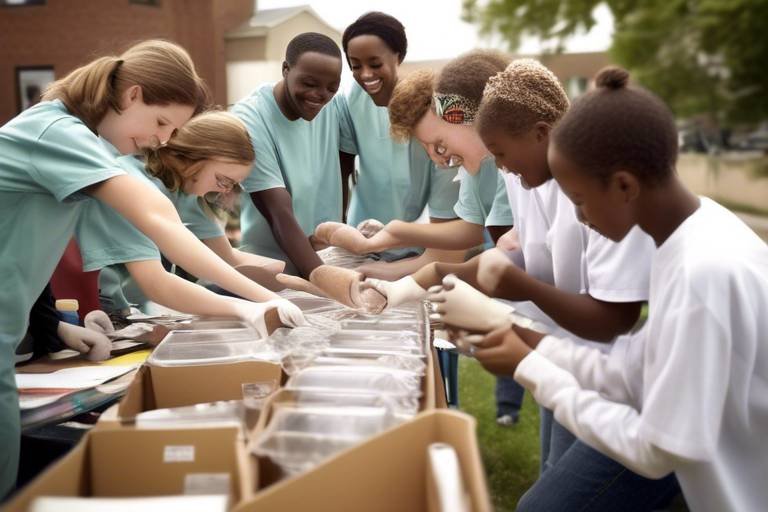The Biology of Social Skills - How We Connect
Have you ever wondered what really makes us connect with others? Why do some people seem to effortlessly make friends while others struggle? The answer lies in the fascinating interplay between our biology and social skills. This article delves into the intricate biological underpinnings that shape how we interact with one another, exploring the brain's role, genetic influences, and environmental factors that all contribute to our ability to form meaningful connections. By understanding these elements, we can better appreciate the complexity of social interactions and perhaps even improve our own social skills.
At the heart of social skills is our brain, a highly complex organ that orchestrates our thoughts, emotions, and actions. The neuroscience of social interaction reveals that our brains are wired to connect. Neural pathways and neurotransmitters play a pivotal role in how we interpret social cues and respond to others. For instance, when we engage in conversation, our brains activate specific regions that help us process language and emotions. This neural activity allows us to empathize with others and understand their feelings, which is crucial for building strong relationships.
But what about the role of genetics? It turns out that our DNA can significantly influence our social behaviors. Certain genetic factors are linked to personality traits such as extraversion, agreeableness, and even our levels of empathy. These traits determine how we interact with others and how we form relationships. For example, individuals with a genetic predisposition towards higher empathy are often more attuned to the emotions of those around them, making it easier for them to connect on a deeper level.
One of the most intriguing players in the biology of social skills is oxytocin, often dubbed the "love hormone." This powerful neurotransmitter significantly influences social bonding, trust, and emotional connections. When we engage in positive social interactions, such as hugging a friend or spending quality time with loved ones, our bodies release oxytocin, fostering a sense of closeness and trust. This hormonal boost not only enhances our feelings of connection but also encourages us to seek out social interactions more frequently.
Research has shown that oxytocin enhances feelings of trust and empathy, making it a crucial element in forming and maintaining social relationships. When oxytocin levels are elevated, individuals are more likely to take social risks, such as confiding in others or reaching out for support. This is why oxytocin is often considered a key ingredient in the recipe for healthy relationships, as it helps to build a foundation of trust that is essential for any meaningful connection.
However, the effects of oxytocin can vary across different social contexts. For instance, oxytocin might promote bonding in familiar settings like with friends and family, but its effects can be less pronounced in interactions with strangers. Understanding these nuances is important, as they highlight how our biological responses can shift depending on the social environment we find ourselves in.
Furthermore, certain genetic markers can predispose individuals to specific social behaviors. For example, variations in genes related to dopamine and serotonin can influence how we engage in social situations. Those with certain genetic traits may find it easier to navigate social landscapes, while others may feel overwhelmed. This genetic blueprint plays a significant role in shaping our social experiences and how we connect with others.
While our biology lays the groundwork for social skills, environmental factors also play a crucial role in developing and refining these abilities throughout life. Our upbringing, cultural background, and even the social dynamics of our communities can greatly influence how we learn to interact with others.
Cultural norms and values shape how we express and perceive social skills. For instance, in some cultures, direct eye contact is seen as a sign of confidence and honesty, while in others, it may be perceived as disrespectful. Understanding these cultural differences is essential for effective communication and relationship-building across diverse societies.
Lastly, early childhood experiences significantly influence social development. The interactions we have as children—whether they’re with parents, peers, or caregivers—determine how we learn to connect and communicate with others as we grow. Positive early experiences can foster strong social skills, while negative ones may lead to challenges in forming connections later in life.
- What is the role of oxytocin in social interactions?
Oxytocin plays a key role in enhancing trust and emotional connections, making it essential for building strong relationships. - Can genetics influence my social skills?
Yes, certain genetic factors can predispose individuals to specific social behaviors, impacting how they engage with others. - How does culture affect social skills?
Cultural norms shape how we express and interpret social skills, influencing communication styles and relationship dynamics.

The Neuroscience of Social Interaction
Understanding the brain's role in social skills reveals a fascinating landscape of neural pathways and neurotransmitters that influence our ability to connect with others. Imagine your brain as a bustling city, where each neuron is a road and every synapse is a traffic light, guiding the flow of information. When we engage in social interactions, this city lights up, with various regions of the brain working in harmony to help us interpret social cues and respond appropriately.
One of the key players in this intricate system is the prefrontal cortex, which is responsible for decision-making, social behavior, and personality expression. This area acts like a conductor of an orchestra, coordinating the different sections of the brain to create a symphony of social understanding. When we meet someone new, our prefrontal cortex helps us assess their behavior, read their facial expressions, and determine the appropriate response. It's no wonder that those with damage to this area often struggle with social interactions, as if the conductor has lost control of the orchestra.
Another crucial component of social interaction is the amygdala, the brain's emotional center. This almond-shaped cluster of nuclei plays a vital role in processing emotions and forming memories associated with social experiences. When we feel fear, joy, or even love, the amygdala is hard at work, helping us to navigate our emotional landscape. For example, when we meet someone who makes us feel anxious, our amygdala triggers a response that might lead us to withdraw or react defensively. Conversely, positive interactions can light up the amygdala in a way that fosters connection and trust.
Neurotransmitters, the chemical messengers of the brain, also play a significant role in social skills. Dopamine, often referred to as the "feel-good" hormone, is released during pleasurable social interactions, reinforcing our desire to connect with others. This is akin to receiving a reward for engaging in social behavior, encouraging us to seek out friendships and build relationships. On the other hand, serotonin helps regulate mood and anxiety, influencing how we approach social situations. A balanced level of serotonin can make us feel more confident and open during interactions, while low levels may lead to social withdrawal.
To summarize, the neuroscience of social interaction is a complex dance of brain regions and neurotransmitters that work together to facilitate our connections with others. Understanding these biological underpinnings not only helps us appreciate the intricacies of human relationships but also sheds light on the challenges faced by those with social difficulties. As we delve deeper into the world of social neuroscience, we can begin to unlock the secrets of what makes us human and how we relate to one another.
- What role does the prefrontal cortex play in social interactions?
The prefrontal cortex is responsible for decision-making and social behavior, helping us interpret social cues and respond appropriately. - How do neurotransmitters influence social skills?
Neurotransmitters like dopamine and serotonin affect our emotions and mood, impacting how we engage with others socially. - What happens if the amygdala is damaged?
Damage to the amygdala can lead to difficulties in processing emotions and forming social memories, affecting social interactions.

When we dive into the fascinating world of genetics, we uncover a treasure trove of insights into how our DNA shapes our social behaviors. It's almost as if our genes are like a blueprint, guiding us on how to interact with others. Have you ever wondered why some people seem to effortlessly connect with others while others struggle? The answer often lies in our genetic makeup. Research indicates that certain genes are linked to personality traits, empathy levels, and even our ability to form relationships. These traits can be seen as the threads that weave the fabric of our social lives.
For instance, the 5-HTTLPR gene, which is involved in serotonin transport, has been shown to influence how we respond to social situations. Individuals with certain variations of this gene may experience heightened sensitivity to social cues, making them more adept at reading emotions. This genetic predisposition can lead to a greater capacity for empathy, allowing for deeper connections with others. On the flip side, those with different variations might find social interactions more challenging, leading to feelings of isolation or anxiety.
Moreover, genetics plays a role in our attachment styles, which are crucial for forming healthy relationships. Secure attachment styles often correlate with positive genetic traits, while insecure styles may be linked to genetic vulnerabilities. This means that our biological inheritance can set the stage for how we relate to others throughout our lives. It's like having a set of tools; some people are equipped with a full toolbox, while others might only have a few basic implements.
Additionally, the interplay between genes and environment is vital. While genetics provide the foundation, environmental factors can either enhance or hinder these innate tendencies. For example, someone with a genetic predisposition for sociability might thrive in a nurturing environment that encourages social interaction. Conversely, a lack of supportive social structures can stifle these genetic advantages, leading to underdeveloped social skills.
In essence, genetics and social behavior are intricately linked, creating a complex dance between our biological heritage and our life experiences. This connection highlights the importance of understanding ourselves and others, as it can foster empathy and improve our interactions. Just as a gardener nurtures plants to help them flourish, understanding the genetic influences on social behavior can help us cultivate better relationships and a more connected community.
- What role do genes play in social behavior? Genes can influence personality traits, empathy levels, and attachment styles, which are all critical for social interactions.
- Can environmental factors override genetic predispositions? Yes, while genetics provide a foundation, environmental influences can enhance or diminish social skills.
- How can understanding genetics improve social skills? By recognizing our genetic influences, we can work on areas where we may struggle and foster better relationships.

Oxytocin, often dubbed the love hormone, plays a pivotal role in our social interactions and emotional connections. This remarkable peptide, produced in the hypothalamus and released into the bloodstream, is not just a simple chemical; it’s a powerful facilitator of social bonds. Imagine it as the glue that binds us to one another, enhancing our ability to form relationships and trust those around us. It’s fascinating how just a small change in our body’s chemistry can lead to profound effects on our social behaviors.
Research has shown that oxytocin is crucial during various social situations. When we hug a loved one, share a laugh with friends, or even engage in deep conversations, our bodies release oxytocin, which fosters feelings of warmth and connection. This hormone is particularly significant during moments of vulnerability, such as childbirth or breastfeeding, where it strengthens the bond between mother and child. In these instances, oxytocin not only promotes attachment but also encourages caregiving behaviors, making it essential for nurturing relationships.
But how exactly does oxytocin influence our interactions? The answer lies in its ability to enhance our perception of social cues. For instance, studies suggest that individuals with higher levels of oxytocin are better at recognizing emotional expressions, allowing them to respond more empathetically. This heightened awareness can lead to improved communication and deeper connections with others. It’s as if oxytocin acts as a social lubricant, making it easier for us to navigate the complexities of human relationships.
Interestingly, the effects of oxytocin can vary based on context. In familiar settings, such as with friends or family, oxytocin tends to promote trust and bonding. However, in unfamiliar or stressful situations, the response to oxytocin may differ. For example, while it can enhance feelings of safety among loved ones, it might also lead to increased suspicion or anxiety when interacting with strangers. This duality highlights the intricate balance oxytocin maintains in our social lives, adapting to the dynamics of our interactions.
To summarize, the role of oxytocin in our social skills is profound and multifaceted. It helps us forge connections, enhances our empathy, and influences how we perceive and respond to others. Understanding this hormone’s impact can provide valuable insights into the biological underpinnings of our social behaviors, shedding light on why we connect the way we do. Just like a conductor guiding an orchestra, oxytocin harmonizes our social interactions, allowing us to create beautiful symphonies of connection and trust.

love hormone,
This article explores the biological underpinnings of social skills, examining how our brains and bodies facilitate connections with others and the impact of these skills on our lives.
Understanding the brain's role in social skills reveals how neural pathways and neurotransmitters influence our ability to connect with others and interpret social cues effectively.
Genetic factors play a significant role in shaping our social behaviors, including personality traits, empathy levels, and how we form relationships with others.
Oxytocin, often referred to as the love hormone, significantly influences social bonding, trust, and emotional connections, highlighting its importance in our social interactions. This remarkable hormone is produced in the hypothalamus and released into the bloodstream, playing a crucial role in various social behaviors. It’s fascinating how something so small can have such a profound effect on our ability to connect with others. Think of oxytocin as the glue that binds relationships together, creating a sense of warmth and trust that makes social interactions more meaningful.
Research shows that oxytocin enhances feelings of trust and empathy, making it a crucial element in forming and maintaining social relationships. When we hug a loved one or share a heartfelt moment, oxytocin levels surge, fostering a sense of connection and safety. This is why you might feel more open and vulnerable after a good conversation or a comforting embrace. It’s like a superpower that helps us break down barriers and build bridges between ourselves and others.
The effects of oxytocin can vary across different social contexts, influencing how we interact with friends, family, and strangers. For instance, while oxytocin can enhance bonding with close friends and family, its effects may differ in more formal or distant relationships. In social situations, the presence of oxytocin can lead to increased prosocial behaviors, such as cooperation and altruism. Imagine oxytocin as a social lubricant, easing the flow of interactions and encouraging us to reach out and connect, regardless of the context.
Certain genetic markers can predispose individuals to specific social behaviors, impacting their ability to engage in social situations and form connections.
Environmental factors, including upbringing and cultural background, play a crucial role in developing and refining our social skills throughout life.
Cultural norms and values shape how we express and perceive social skills, affecting communication styles and relationship dynamics across diverse societies.
Early childhood experiences significantly influence social development, determining how individuals learn to interact and connect with others as they grow.
- What is oxytocin? Oxytocin is a hormone produced in the hypothalamus that plays a key role in social bonding and trust.
- How does oxytocin affect relationships? Oxytocin enhances feelings of trust and empathy, strengthening emotional connections between individuals.
- Can oxytocin be influenced by external factors? Yes, social interactions, physical touch, and certain experiences can increase oxytocin levels in the body.

significantly influences social bonding, trust, and emotional connections, highlighting its importance in our social interactions.
This article explores the biological underpinnings of social skills, examining how our brains and bodies facilitate connections with others and the impact of these skills on our lives.
Understanding the brain's role in social skills reveals how neural pathways and neurotransmitters influence our ability to connect with others and interpret social cues effectively.
Genetic factors play a significant role in shaping our social behaviors, including personality traits, empathy levels, and how we form relationships with others.
Oxytocin, often referred to as the love hormone, significantly influences social bonding, trust, and emotional connections, highlighting its importance in our social interactions. This fascinating hormone is not just a chemical; it's a vital player in the symphony of human relationships. When we engage in social activities, such as hugging a friend or spending time with loved ones, our bodies release oxytocin, creating a sense of warmth and connection. It's like a social glue that binds us together, making interactions feel more meaningful.
Research shows that oxytocin enhances feelings of trust and empathy, making it a crucial element in forming and maintaining social relationships. Imagine meeting someone new; the level of trust you feel can often be traced back to the oxytocin levels in your body. Higher oxytocin levels can lead to increased trust, allowing individuals to open up and engage more deeply with one another. This is particularly important in building friendships and romantic relationships, where trust serves as the foundation for deeper emotional connections.
The effects of oxytocin can vary across different social contexts, influencing how we interact with friends, family, and strangers. For instance, when we are with close friends or family, oxytocin levels tend to be higher, fostering an environment of trust and intimacy. However, when interacting with strangers, the dynamics change, and oxytocin may not play as significant a role. Understanding these nuances can help us navigate social situations more effectively, knowing when to lean on the power of oxytocin to enhance our interactions.
Certain genetic markers can predispose individuals to specific social behaviors, impacting their ability to engage in social situations and form connections.
Environmental factors, including upbringing and cultural background, play a crucial role in developing and refining our social skills throughout life.
Cultural norms and values shape how we express and perceive social skills, affecting communication styles and relationship dynamics across diverse societies.
Early childhood experiences significantly influence social development, determining how individuals learn to interact and connect with others as they grow.
- What is oxytocin? Oxytocin is a hormone produced in the hypothalamus that plays a key role in social bonding, trust, and emotional connections.
- How does oxytocin affect social interactions? It enhances feelings of trust and empathy, making it easier for people to connect and form relationships.
- Can oxytocin levels change based on context? Yes, oxytocin levels can vary depending on the social situation, influencing how we interact with different people.
- Are there genetic factors that influence social skills? Absolutely! Certain genetic markers can predispose individuals to specific social behaviors.
- How do early experiences shape social skills? Early childhood experiences play a critical role in developing social skills, affecting how individuals learn to interact with others.

When we think about trust, we often imagine the warm feeling of safety and connection that comes from being close to someone. This feeling isn't just a product of our experiences; it's also deeply rooted in our biology. The hormone oxytocin, commonly known as the "love hormone," plays a pivotal role in fostering this sense of trust. Research has shown that oxytocin levels increase during moments of bonding, such as hugging, cuddling, or even just sharing a meaningful conversation. This surge in oxytocin not only makes us feel good but also enhances our ability to trust others, creating a positive feedback loop that strengthens our social ties.
But how exactly does oxytocin work in the brain? It acts as a neurotransmitter, transmitting signals between neurons and influencing various brain regions associated with emotional responses. For instance, studies have found that oxytocin can dampen the activity of the amygdala, the part of the brain responsible for fear and anxiety. By reducing our fear response, oxytocin allows us to approach social situations with a more open heart and mind, ultimately leading to deeper connections with others.
Interestingly, the effects of oxytocin can vary depending on the social context. For example, when interacting with friends or loved ones, oxytocin levels may rise significantly, enhancing feelings of trust and intimacy. However, in situations involving strangers or perceived threats, the response can differ. In some cases, oxytocin may not promote trust but rather caution, making us more discerning about whom we let into our inner circle. This duality highlights the complexity of human relationships and the intricate role oxytocin plays in shaping our social experiences.
To illustrate the relationship between oxytocin and trust, consider the following table that summarizes key findings from various studies:
| Study | Findings |
|---|---|
| Heinrichs et al. (2009) | Oxytocin administration increased trust in economic games. |
| Kosfeld et al. (2005) | Participants with oxytocin were more likely to trust strangers. |
| Domes et al. (2010) | Oxytocin enhanced empathy and emotional recognition. |
This table highlights just a few examples of how oxytocin significantly impacts trust and social bonding. It's fascinating to think about how a single hormone can influence our decisions and interactions with others. So, the next time you feel a rush of warmth and connection with someone, remember that oxytocin is likely at play, quietly working behind the scenes to strengthen the bonds that make us human.
- What is oxytocin? Oxytocin is a hormone produced in the hypothalamus and released into the bloodstream, influencing social bonding, trust, and emotional connections.
- How does oxytocin affect trust? Oxytocin enhances feelings of trust and reduces anxiety, allowing individuals to form deeper connections with others.
- Can oxytocin influence my relationships? Yes, higher levels of oxytocin can lead to increased empathy and improved social interactions, positively impacting relationships.
- Are there any risks associated with oxytocin? While oxytocin is generally safe, its effects can vary based on context and individual differences, sometimes leading to cautious behavior in unfamiliar situations.

When we think about oxytocin, often dubbed the "love hormone," it's easy to imagine its role in romantic relationships or the bond between a mother and her newborn. However, the influence of oxytocin extends far beyond these intimate connections. It plays a pivotal role in various social contexts, shaping how we interact with different people in our lives. Understanding how oxytocin functions in these diverse situations can provide insight into the complexity of human relationships.
For instance, in friendship dynamics, oxytocin can enhance feelings of trust and camaraderie. When friends engage in shared experiences, such as celebrating milestones or overcoming challenges together, oxytocin levels can rise, strengthening their bond. This is not just a feel-good hormone; it actively encourages individuals to form deeper connections and foster loyalty within friendships.
In the context of family relationships, oxytocin plays a crucial role in nurturing and attachment. Parents often experience a surge of oxytocin during moments of affection with their children, which helps to solidify the emotional connection. This bonding hormone ensures that caregivers remain attentive and responsive to their children’s needs, promoting a secure attachment that is essential for healthy emotional development.
Interestingly, oxytocin's effects can also be observed in stranger interactions. Studies have shown that when individuals are administered oxytocin, they tend to exhibit more prosocial behaviors, such as increased generosity and cooperation. This suggests that oxytocin may lower social barriers, encouraging us to connect with those we do not know well. However, the context matters; while oxytocin can promote trust, it may also lead to in-group favoritism, where individuals feel more connected to those who share similar backgrounds or beliefs.
Moreover, the impact of oxytocin is not uniform across all social situations. For example, in competitive environments, such as workplaces or sports, elevated oxytocin levels might not always lead to positive interactions. Instead, it can create a heightened sense of loyalty to one’s team or group, potentially at the expense of others. This duality highlights the complexity of oxytocin's role in our social fabric.
Ultimately, understanding oxytocin's role in these different contexts underscores the importance of this hormone in shaping our social experiences. It acts as a biological facilitator of connection, trust, and empathy, making it a key player in our social lives. As we navigate through various relationships, recognizing how oxytocin influences our interactions can help us foster healthier connections and improve our overall social well-being.
- What is oxytocin?
Oxytocin is a hormone that plays a significant role in social bonding, reproduction, and childbirth. It is often referred to as the "love hormone" due to its involvement in emotional connections. - How does oxytocin affect social behavior?
Oxytocin enhances feelings of trust and empathy, which can improve social interactions and strengthen relationships. - Can oxytocin be administered artificially?
Yes, oxytocin can be administered through nasal sprays or injections, and it is being studied for its potential therapeutic effects in various social and psychological disorders. - Does oxytocin work the same way for everyone?
Not necessarily. Individual responses to oxytocin can vary based on genetic, environmental, and situational factors.

When we dive into the fascinating world of genetic predispositions, it becomes clear that our DNA plays a pivotal role in shaping how we engage with others. Imagine your genes as the blueprint for a house; they determine the structure, but the interior design—how we express our social skills—is influenced by various factors, including our environment and experiences. Certain genetic markers can predispose individuals to specific social behaviors, such as extroversion or introversion, which can significantly impact their ability to engage in social situations.
For instance, research has identified specific genes, such as the OXTR gene, which is linked to the oxytocin receptor. Variations in this gene can influence how we respond to social stimuli and our capacity for empathy. Those with certain variations might find it easier to connect emotionally with others, while others might struggle to form deep relationships. It's almost like having a social toolkit; some people are born with more tools at their disposal than others.
Moreover, the interplay between our genetics and social behavior is not a simple cause-and-effect relationship. It’s more like a dance, where our genetic predispositions interact with environmental factors, shaping our social skills over time. For example, a person might have a genetic inclination towards being sociable, but if they grow up in a nurturing environment that encourages social interaction, they are likely to develop strong social skills. Conversely, someone with the same genetic predisposition raised in a more isolated setting may not fully realize their potential.
To illustrate this concept further, let’s consider a few key genes and their associated traits:
| Gene | Associated Trait |
|---|---|
| OXTR | Empathy and social bonding |
| DRD4 | Novelty-seeking and risk-taking in social contexts |
| 5-HTTLPR | Anxiety and social withdrawal |
As seen in the table, these genes can predispose individuals to varying social behaviors, influencing how they navigate social landscapes. This genetic framework doesn’t dictate our destiny, but rather lays the groundwork for our social interactions. Think of it as a playlist of potential social behaviors; while you have the songs available, it’s up to you to hit play and create your unique social symphony.
Ultimately, understanding genetic predispositions offers valuable insights into why we behave the way we do in social settings. It highlights the importance of considering both nature and nurture in the development of social skills. So next time you find yourself connecting with someone, remember that there’s a complex blend of genetics and experiences at play, crafting the intricate tapestry of human interaction.
- What are genetic predispositions? Genetic predispositions refer to the inherited traits that can influence an individual's behavior, personality, and social skills.
- How do genes affect social skills? Certain genes can predispose individuals to specific social behaviors, impacting their ability to connect and interact with others.
- Can environment override genetic predispositions? Yes, environmental factors such as upbringing, culture, and personal experiences can significantly influence the expression of genetic predispositions.

When we think about social skills, it’s easy to assume that they’re solely a product of our innate personality traits or genetic makeup. However, the truth is much more nuanced. Our environment plays a pivotal role in shaping how we develop and refine these essential skills. From the moment we enter the world, the influences surrounding us—our families, communities, and cultures—begin to mold our social interactions. Imagine social skills as a plant; while genetics provide the seed, the soil, sunlight, and water are the environmental factors that allow it to grow.
One of the most significant environmental influences comes from our upbringing. Children raised in nurturing and communicative households tend to develop stronger social skills than those who grow up in less interactive environments. For example, a child who frequently engages in conversations with parents and siblings is more likely to learn the nuances of communication, such as tone, body language, and emotional expression. In contrast, a child who experiences neglect or limited social interaction may struggle with these critical skills later in life.
Moreover, cultural background plays a crucial role. Different cultures have varying norms regarding communication and social behavior. For instance, in some cultures, direct eye contact is a sign of confidence and honesty, while in others, it may be seen as disrespectful. Understanding these cultural differences is essential for effective communication and relationship-building. Here’s a quick comparison of how different cultures perceive social interactions:
| Cultural Context | Communication Style | Social Norms |
|---|---|---|
| Western Cultures | Direct and assertive | Emphasis on individualism |
| Eastern Cultures | Indirect and subtle | Emphasis on collectivism |
| Latin American Cultures | Warm and expressive | Value on personal relationships |
In addition to cultural influences, the role of early experiences cannot be overstated. Those formative years are critical for social development. Children who engage in group activities, such as team sports or collaborative projects, learn valuable lessons about teamwork, negotiation, and conflict resolution. These experiences serve as building blocks for future interactions, teaching kids how to navigate the complexities of social dynamics.
Even the broader environment, such as school settings and peer groups, contributes to social skill development. Schools that promote inclusive practices and encourage diverse interactions help students learn to communicate effectively with a variety of individuals. Conversely, environments that foster cliques or exclusion can hinder the development of healthy social skills, leading to difficulties in forming lasting relationships later in life.
In summary, while our biology lays the groundwork for social interactions, it is our environment that truly shapes how we connect with others. By understanding the profound impact of upbringing, cultural context, and early experiences, we can appreciate the intricate dance of nature and nurture in developing social skills. So, the next time you find yourself in a social setting, consider the myriad of factors that have influenced your ability to engage and connect with those around you.
- How does upbringing affect social skills? Upbringing influences communication patterns, emotional expression, and interaction styles, shaping how individuals connect with others.
- What role does culture play in social behavior? Culture dictates social norms and communication styles, affecting how individuals perceive and engage in social interactions.
- Can social skills be improved through experience? Yes, engaging in diverse social situations can enhance social skills and improve one's ability to navigate social dynamics.

Cultural influences play a pivotal role in shaping our social skills, acting as the invisible threads that weave our interactions with others. Imagine walking into a room filled with people from different backgrounds; the way they communicate, express emotions, and even engage in small talk can vary dramatically. These differences are not just quirks; they are deeply rooted in cultural norms and values that dictate how we perceive and perform social behaviors.
For instance, in some cultures, direct eye contact is seen as a sign of confidence and honesty, while in others, it may be perceived as disrespectful or confrontational. This divergence can lead to misunderstandings and misinterpretations in social interactions. In a world that is becoming increasingly globalized, understanding these cultural nuances is more important than ever. It’s like learning a new language; you don’t just need to know the words, but also the context in which they are used.
Moreover, cultural influences extend beyond mere communication styles. They shape our concepts of personal space, the appropriateness of touch, and even the way we express emotions. For example, in collectivist cultures, group harmony is often prioritized over individual expression, leading to more subtle forms of communication. In contrast, individualistic cultures may encourage more overt displays of emotion and personal opinion.
To illustrate this further, consider the following table that highlights some key differences in social behaviors across various cultures:
| Cultural Aspect | Collectivist Cultures | Individualistic Cultures |
|---|---|---|
| Communication Style | Indirect, context-based | Direct, explicit |
| Concept of Self | Group-oriented | Self-oriented |
| Personal Space | Closer proximity | Greater distance |
| Emotional Expression | Subdued | Expressive |
As we navigate through our social lives, we must be aware of these cultural influences. They are not just academic concepts; they are the lenses through which we view the world and interact with others. Recognizing and respecting these differences can enhance our ability to connect with people from various backgrounds, fostering deeper relationships and mutual understanding.
In conclusion, cultural influences are a vital aspect of social skills that cannot be overlooked. They shape our behaviors, perceptions, and interactions in profound ways. By embracing these differences, we not only enrich our own social experiences but also contribute to a more harmonious and understanding global community.
- How do cultural influences affect communication? Cultural influences dictate the norms and values that shape how we express ourselves and interpret others' messages.
- Can understanding cultural differences improve social skills? Absolutely! Being aware of cultural differences can lead to more effective communication and stronger relationships.
- What role does upbringing play in social skills? Upbringing significantly shapes our social behaviors and interactions, often laying the groundwork for how we connect with others.

Early experiences play a pivotal role in shaping our social skills and behaviors. From the moment we are born, we are immersed in an environment that influences how we perceive and interact with the world around us. Think of it as the foundation of a house; if the foundation is strong, the house stands tall and sturdy. Similarly, our early interactions set the stage for how we build relationships throughout our lives.
During the formative years, children are like sponges, absorbing everything from the emotional cues of their caregivers to the social norms of their culture. For instance, a child raised in a nurturing environment, where affection and communication are abundant, is likely to develop strong social skills. They learn to express emotions, understand empathy, and communicate effectively. In contrast, children who experience neglect or inconsistent care may struggle with social interactions, often leading to difficulties in forming relationships later in life.
Moreover, the role of early experiences extends beyond just emotional support. It encompasses various aspects of development, including:
- Attachment Styles: Secure attachment can lead to healthier relationships, while insecure attachment may result in anxiety or avoidance in social situations.
- Social Learning: Children learn by observing the behaviors of those around them, picking up cues on how to interact, negotiate, and resolve conflicts.
- Communication Skills: Early exposure to language and dialogue fosters effective communication, enhancing one's ability to express thoughts and feelings.
Research has shown that these early experiences can have long-lasting effects. For example, a study conducted by the American Psychological Association found that children who received consistent emotional support demonstrated better social competence as adolescents compared to those who did not. This illustrates that the seeds of social skills are sown in early childhood, influencing how we navigate social landscapes as we grow.
Furthermore, the impact of early experiences is not solely limited to family dynamics. The broader environment, including schools and peer interactions, also plays a crucial role. Positive early schooling experiences, where children engage in cooperative play and group activities, can enhance social skills and foster a sense of community. Conversely, negative experiences, such as bullying or social exclusion, can hinder social development and lead to lasting emotional scars.
In conclusion, the role of early experiences in shaping social skills cannot be overstated. They lay the groundwork for how we connect with others, navigate relationships, and understand social dynamics. By recognizing the importance of these formative years, we can better appreciate the complexities of social behavior and the ways in which we can foster healthy relationships throughout our lives.
- How do early experiences affect adult relationships?
Early experiences can significantly shape attachment styles, communication patterns, and emotional responses, influencing how we relate to others in adulthood. - What role do parents play in developing social skills?
Parents provide the first social interactions for children, modeling behaviors and responses that shape their understanding of relationships and communication. - Can negative early experiences be overcome?
While negative experiences can impact social skills, therapy, supportive relationships, and positive environments can help individuals develop healthier social behaviors.
Frequently Asked Questions
- What is the role of the brain in social skills?
The brain plays a crucial role in social skills by processing social cues and facilitating connections with others. Neural pathways and neurotransmitters help us interpret emotions, body language, and facial expressions, allowing us to engage effectively in social interactions.
- How do genetics influence social behavior?
Genetics significantly impacts our social behavior by shaping personality traits, empathy levels, and relationship-building abilities. Certain genetic markers can predispose individuals to exhibit specific social behaviors, affecting how they interact with others.
- What is oxytocin, and why is it important?
Oxytocin, often called the "love hormone," is a hormone that plays a vital role in social bonding, trust, and emotional connections. It enhances feelings of empathy and trust, making it essential for forming and maintaining healthy social relationships.
- How does oxytocin affect trust in social interactions?
Research indicates that oxytocin enhances feelings of trust, which is crucial for building and maintaining social relationships. Higher levels of oxytocin can lead to increased empathy and a stronger sense of connection with others.
- Does the effect of oxytocin vary in different social situations?
Yes, the effects of oxytocin can differ based on the social context. For instance, it may promote bonding with family and friends while influencing interactions with strangers differently, highlighting the complexity of social dynamics.
- What environmental factors impact social skill development?
Environmental factors such as upbringing, cultural background, and early experiences significantly shape our social skills. These elements influence how we learn to interact with others and develop our ability to connect throughout life.
- How do cultural norms affect social skills?
Cultural norms and values dictate how we express and perceive social skills, impacting communication styles and relationship dynamics. Different cultures may prioritize various aspects of social interaction, leading to diverse ways of connecting with others.
- What role do early experiences play in social development?
Early childhood experiences are pivotal in social development, as they determine how individuals learn to interact and connect with others. Positive or negative social interactions during formative years can shape one's ability to form relationships later in life.

